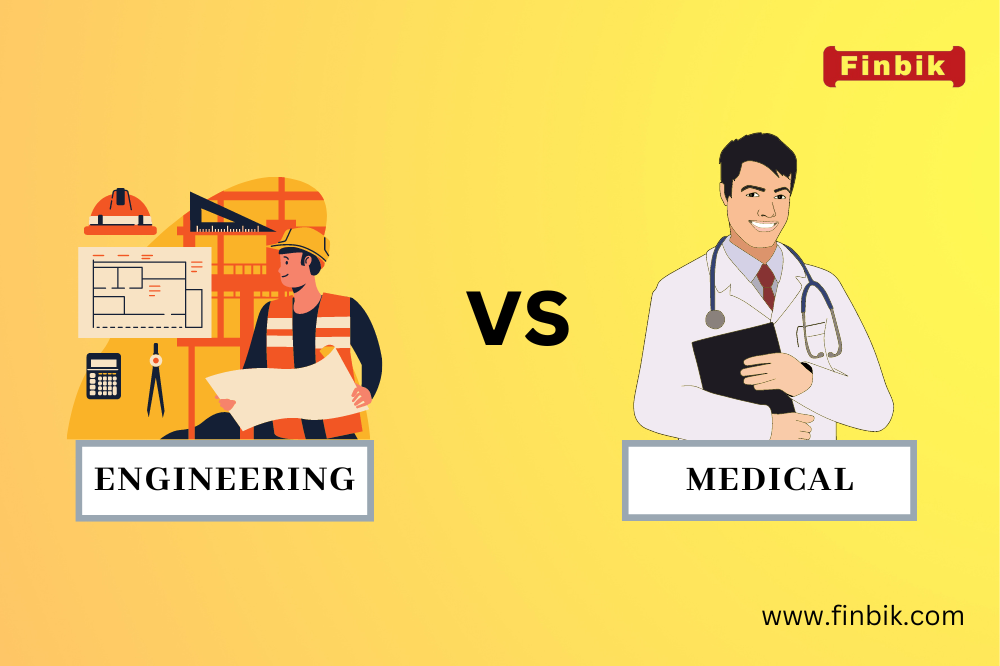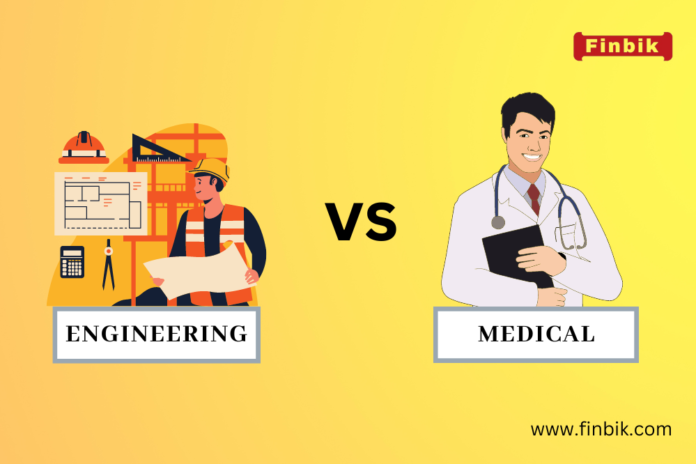The biggest concern of a 12th-grade student after finishing final exams is choosing a career that will maximize profits, offer good knowledge, and divert their career in a direction in line with their interests, talents, and passions. In India, the debate of Engineering vs Medical occurs now and then because both fields hold a huge demand, opportunity, and good pay scale in terms of any other field. This article helps you to distinguish between both the fields widely by remodeling the core points of Engineering vs Medical.
Engineering vs Medical – Which one to choose?
Student Life for Engineering and Medical Students
Engineering vs. Medical Challenges
Highlights of Engineering vs. Medical

Engineering vs Medical – Which one to choose?
Engineering vs Medical Scope
Both engineering and medicine are fruitful fields. These two roles are globally recognized and investing time in either one of them will prove to be an asset for a lifetime. As there are many branches in engineering, students get a chance to explore and choose the stream in which they fit in. As a result, the job positions have also increased in the engineering sector in recent years.
Writing about the medical field, this field is advanced and vast. The job options in the medical domain will never end and because of its demand across the globe, it has slightly more scope than engineers out there. In the past few years, due to an increase in covid-19, other medical factors, and diseases, the need for medical professionals is reaching a peak position.
Our country’s economy owes a lot to both of these fields, and professionals working in both fields benefit greatly from their work.
Skills Required
It is important to take note of the skills that one needs to build to start their career in the right place and the right domain. Skills building is the foundational step to begin working with the right view and conscience of what a professional is doing and which help them to think more technically.
Following are the skills required for an engineering professional:
- Technical skills:
Having technical skills is mandatory. Technical knowledge of the field is important to bring the outcomes of a problem more easily and quickly.
- Problem-solving skills:
This skill determines that the candidate can solve the given problem more easily and with less amount of time than others. This skill helps them to stand out from others.
- Creativity:
Creative thinking is required in the field to bring more unique solutions to the problems that come across in the engineering career.
- Ability to work under pressure:
No matter what happens, the professional should have the ability to even work under pressure and complete the given tasks on time.
- Innovative skills:
Innovation is the quality of a good engineer. A good engineer should be able to come up with good ideas when needed.
- Communication skills:
Having good soft skills in the working environment will help to communicate easily and put forward thoughts and suggestions more clearly.
- Teamworking skills:
Every engineer must be capable of working in a team. Leading a team or working under a team highlights the leadership quality of a good engineer.
Listed below are the mandatory skills for a medical student:
- Emotional Intelligence:
Emotional thinking is the highest quality that a medical professional should possess to understand the needs of the patient and how one can improve them.
- Patience:
Patience is required by the professional to work in extreme conditions when the time comes.
- Decision making:
A good medical professional should know when and what decision would be better for the organization and an individual.
- Communication skills:
This ability overlaps with engineering skills, and both fields require high communication skills.
- Professionalism:
A professional attitude makes work more efficient and is one of the traits of a leader.
- Resilience:
Even in tough times, the medical professional should quickly recover from difficulties.
Student Life for Engineering and Medical Students
Both the courses include week-long working hours, understanding each concept clearly, and investing the time incorrect place at the correct time to avoid any delay. One cannot mug up things in both the domains and scoring in each of the subjects is difficult.
Students under the engineering domain work to gain industrial knowledge, computer applications, mechanics and dedicate a lot of time to projects and practical knowledge.
A medical student learns about the anatomy and physiology of different living organisms, the psychological makeup of people, and the types and functions of different organs.
Engineering vs. Medical Challenges
Students in both domains face a few challenges even after completing the academics successfully in their workspace. Hurdles occur and engineering and medical students have to overcome them even if the complexity is high.
The major challenges faced by engineering students are:
- Lack of job opportunities in a particular domain increases due to an increase in students concentrating on only one engineering field leaving other domains. For example, in recent years, students in the IT field are increasing due to which job opportunities in the software sector are decreasing or the pay scale of the engineer decreases simultaneously.
- As most mechanical, textile, and agricultural industries are located in the countryside, it becomes difficult for an engineer to move from the city to the suburbs and adapt to that environment.
- Unemployment increases due to loss of projects caused during recession periods or decreased quality of submitted projects.
- High competition in the workspace can be a challenge for a fresher to cope with the colleagues and can sometimes lead to a downfall.
- Lesser industry interaction.
The major challenges faced by medical students are:
- A major challenge faced by a medical student is work overload. During peak time, the work may increase and students might get frustrated at the same time.
- Excess energy is required to complete the tasks on time and pressure remains.
- Lack of time is also a major challenge in the life of a medical student.
- High incidence of personality traits potentially leading to distress.
- Encountering ethical or distressing situations, including exposure to death and distress.
Highlights of Engineering vs. Medical
| Engineering | Medical | |
| Duration | 4 years | 5 years |
| Average fees/year | INR 1 lakh – INR 5 lakhs | INR 2 lakhs – INR 10 lakhs |
| Eligibility | 10+2(Physics, Chemistry, and Mathematics) | 10+2(Physics, Chemistry, and Biology) |
| Entrance exam | JEE Main, BITSAT, CET | NEET |
| Average salary/year | INR 5,74,827 / year | INR 7,50,000 / year |
| Job positions | Mechanical graduate, software engineer, project manager, electrical lab assistant, mechatronics, civil constructor. | Internal medicine doctor, veterinary doctor, family practice doctor, Doctor assistant, pharmacist. |
The salary data in the table is sourced from: https://in.talent.com/
One should understand the complexity of both the courses and choose correctly and wisely what’s best for them. A determined decision is required in pursuing either of the fields as it is the investment of a lifetime. One should decide their aptitude and the work environment they would prefer. A person who knows his or her aptitude is not only able to select the best but is also in a position to gain expertise in a field they enjoy.
Students who have higher aptitude in mathematics and physics can opt for engineering and students who are keen to learn anatomy, life sciences and biology can go for medical.
The working environment can sometimes become extreme in both domains, so considering the workspace before starting anything is very important.
Hope this article clears every doubt of the student who stumbles upon the question, “Engineering vs Medical-which is better?”. The article tried to make the students aware of the major points to fix their dilemma between Engineering vs Medical.
Articles You May Like
Highest Paid Jobs in India in Science Field
Top 10 Engineering Exams in India

